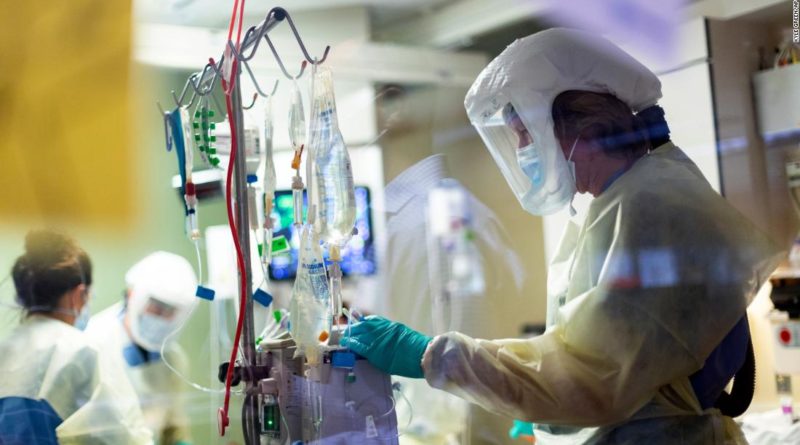US coronavirus: Covid-19 cases forcing hospitals to ration care is unfair and unacceptable, expert says
Montana’s health care system is under that strain, including St. Peter’s Health in Helena, which is operating under crisis standards of care.
“We are at the point where not every patient in need will get the care we might wish we could give. It is not business as usual at your local health care system,” Dr. Shelly Harkins, chief medical officer of St. Peter’s Health, said.
Crisis standards of care are activated in emergency medicine when there are mass casualty events, like after a mass shooting or large fire, and medical professionals have to ration their care, associate professor of emergency medicine and associate dean of the School of Public Health at Brown University, Dr. Megan Ranney explained.
In the past week, the US has averaged around 1,926 Covid-19 deaths a day, the highest average since early March.
“It puts our health care providers in a state of moral injury where they’re going to have to see people die who they would normally be able to take care of,” Ranney said. “It is an unacceptable state for us to be in in the United States of America, and it is not fair to those doctors, nurses, respiratory therapists, EMS providers.”
As long as hospital systems are in that critical state, Ranney said, some people aren’t going to get hospital beds. And others won’t be able to get care.
“People who come in in cardiac arrest may not get CPR, and patients who would otherwise get hospitalized may be sent home with loved ones who are going to be scared and not have full capacity to take care of them simply because there aren’t enough beds and nurses,” Ranney said.
In Kentucky, nearly 85% Covid-19 deaths have been in partially or unvaccinated people, Gov. Andy Beshear said Thursday. The partially vaccinated or unvaccinated also accounted for more than 87% of Covid-19 cases and about 92% of hospitalizations, he added.
“I hope that you … hear very clearly that the number one thing that we can do to get through this is to get vaccinated. By percentage, 90+ percent of folks that end up hospitalized are unvaccinated. So how do we not overrun our hospitals? We get vaccinated,” Beshear said.
Should previously infected people get vaccinated?
On the question of whether previously infected people should be vaccinated to be protected from the virus, Fauci said recovered patients have a “considerable degree of immunity.”
However, he emphasized to CNN’s Jake Tapper on “State of the Union” Sunday, that it’s unclear how long that protection lasts.
“They do have protection. The one thing that we are not aware of yet, and hopefully we’ll get that data, is what the durability of protection is and looking ahead, whether or not that type of protection that’s induced by natural infection, how that will be against the variety of variants as they arrive,” Fauci said.
Ranney said she believes previously infected people should be subject to vaccine mandates because the amount of protection a previous infection offers is not standard and, right now, there’s no way of confirming someone has recovered from a prior infection.
“We need a way to confirm that people have immunity and for now that’s showing your (vaccine) card,” Ranney said.
And while much of conversation has centered around booster doses, that is not the highest priority at the moment, Fauci told NBC Sunday.
“We think it’s important to get boosters to people, but the overwhelming highest priority is to vaccinate the unvaccinated,” Fauci said.
What to expect for booster doses
“The reason they made that decision is because of the FDA’s judgement that the goal of vaccination is to prevent severe disease, hospitalization and death, and the only people for whom we’ve seen that two doses don’t do that are the age 60 or 65 plus,” Ranney said.
“For the rest of us, hold tight and stay tuned.”
The CDC is meeting this week with its vaccine advisers, and the agency must give its stamp of approval before any booster doses can be officially administered.
Though Fauci has said he thinks all Americans will likely eventually be recommended a booster dose, he clarified that he does not think the FDA made a mistake in the recommendations.
“I have no problem at all with their decision. The thing that I’m saying is that data will continue to come in and I believe you’re going to see an evolution of this process as we go on in the next several weeks to months,” Fauci said Sunday.
One evolution could be the evaluation of data for boosters from Moderna and Johnson & Johnson, which Fauci said he anticipates will come within the next three weeks.
CNN’s Amanda Sealy and Aya Elamroussi contributed to this report.




